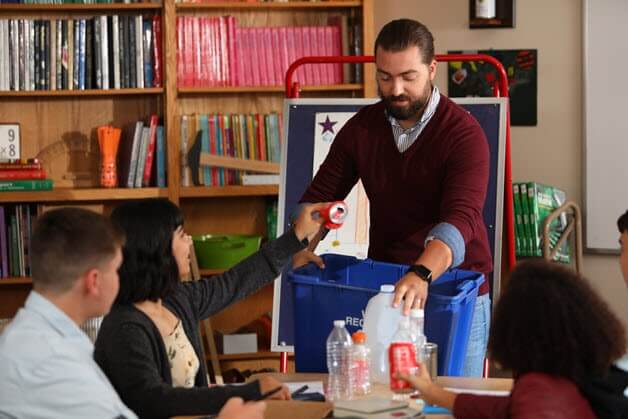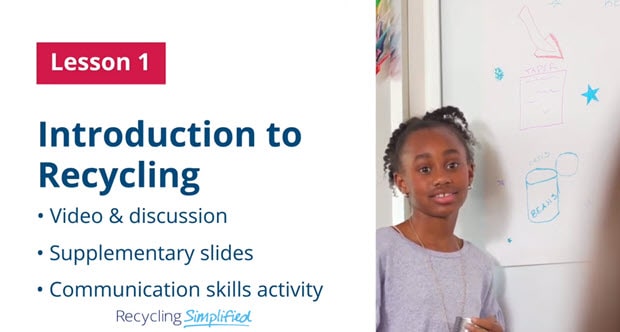
Talking Trash in the Classroom: Free Program Helps Students Learn About Recycling
Trash-talking is not normally encouraged in schools, but that’s changed with the newly launched Recycling Simplified Education Program developed for teachers by teachers to engage PreK through 12th grade students in addressing real-world issues related to sustainability and recycling. Read what a teacher who helped us develop the program has to say.Byline: BTB Editor
October 4, 2019 / Time to read: 5 minBy Debra Pryor, educator
Trash-talking is not normally encouraged in schools, but that has changed with the newly launched
As teachers, one of our key goals in education today is integrating STEM subjects (science, technology, engineering, and math) across the curriculum, to help prepare students for the high-tech challenges that lie ahead. As this program was developed, our team of teachers contributed and reviewed the lesson plans and materials to ensure they are grade-appropriate in content and vocabulary as well as in addressing national standards for STEM subjects.
We know that the majority of Americans – nearly 90%, according to a recent survey – agree that recycling is important but are confused about what materials can and can’t be recycled. And we also know that kids want to make a difference in the world around them and are really engaged by activities related to protecting the environment and saving natural resources. With that in mind, we designed the Recycling Simplified program to provide interesting and fun ways for students to learn about recycling properly and to share that information with their families.
Our research among teachers and students alike, as well as information from the recycling and waste disposal industry, tells us there’s a lot of “wish-cycling” (also referred to as “aspirational recycling”) taking place. This refers to placing items that you hope are recyclable into a recyclables collection container. Unfortunately, many of these items are not recyclable and, in fact, can cause problems at recycling centers.
In the Recycling Simplified program, students learn about the recycling process from start to end, including how improperly recycled items can contaminate other recyclables. For example, in the lesson called “Recycling Detectives,” students work together in small groups to sort cards with pictures of common items into recyclables, non-recyclables, and potential recyclables. Then they practice collaborative and critical thinking skills in deciding how some of the potential recyclables can be made recyclable.

We structured the program in four grade ranges, from PreK through high school. Each grade range contains everything teachers need, including step-by-step lesson plans, engaging videos and activities, graphic worksheets, handouts to take home, and other supporting materials for each lesson. Also, each lesson is connected to grade-appropriate national standards for STEM subject areas and other areas like English language arts and literacy, social studies, etc.
We believe this flexible design makes it easy to use the lessons as a complete unit or as individual lessons within our existing curriculum plans for the grades we teach. Each lesson in the grade range gives students a deeper awareness and understanding of the broader issues related to conserving natural resources through recycling, such as the need to reduce the overall amount of trash we produce.
The entire program is available on the
All of us who worked on developing this program are very proud of it, as well as grateful to Republic Services for making the program available for free to teachers across the country. We love teaching our students about recycling and sustainability. And we particularly enjoy seeing them get excited about these issues that affect all of us, because our students are tomorrow’s problem solvers.
Whether you’re a teacher, parent, student, or community partner, we hope you’ll help spread the word and encourage teachers and schools in your community to use the program.
Debra Pryor was a middle school teacher and curriculum specialist before she founded Partners In Brainstorms, a consulting firm that helps organizations develop PreK–12 education programs and resources for use in the classroom.

